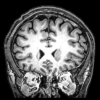https://www.ncbi.nlm...les/PMC1885050/
An evaluation of potential mechanism-based inactivation of human drug metabolizing cytochromes P450 by monoamine oxidase inhibitors, including isoniazid.
(phenelzine (Nardil) and isoniazid belong to Hydrazine class)
Hydrazine MAO inhibitors generally exhibited greater inhibition of CYP following preincubation, whereas this was less frequent for the propargylamines, and tranylcypromine and moclobemide. Phenelzine (Nardil) and isoniazid inactivated all CYP but were most potent toward CYP3A and CYP2C19.
Lurasidone (Latuda) is apparently substrate of CYP3A4.
Tranylcypromine (Parnate) in addition to having apparently generally lower CYP-inhibition conflicts, is also more researched for schizophrenia based on Google Scholar search with terms like
allintitle: phenelzine OR tranylcypromine schizophrenia OR schizophrenics
allintitle: monoamine oxidase inhibitor OR inhibitors schizophrenia
Of those hits only 1 is for phenelzine and that article has not been cited and doesn't seem to be easily accessible and is probably written in Italian.
http://www.sciencedi...924977X17302304
Tranylcypromine in mind (Part II): Review of clinical pharmacology and meta-analysis of controlled studies in depression
3.4. Tranylcypromine adjuvant to antipsychotic drugs in negative syndrome of schizophrenia
The use of TCP as a “psychic energizer” and an adjuvant to antipsychotic drugs, mainly trifluoperazine, has been reported in so-called defect schizophrenia as early as 1960 (Kruse, 1960; Singh and Free, 1960). A pharmacoepidemiologic study in two German university clinics revealed in 1994 that 8% of TCP patients were suffering from schizophrenia (Schmidt et al., 1994). This approach has been supported on a clinical and theoretical basis by the observation that atypical depression shares some characteristics with schizophrenia with negative symptoms (Parker et al., 2002) and by the hypothesis of dopaminergic and norepinephrinergic hypofrontality (Da Silva et al., 2008). TCP is expected to improve negative schizophrenia by increasing prefrontal cortex dopamine and norepinephrine neurotransmission.
A controlled study published in 1987 included 30 chronic schizophrenic outpatients with predominant emotional withdrawal, motor retardation, and blunted affect and only minimal positive symptoms. Patients were treated with 300 mg/day chlorpromazine, whereas half each received adjuvant 20 mg/day TCP or placebo over 4 months. Improvement was observed in 11 patients on TCP (73%) and no patients on placebo. After switching the placebo group to TCP for an additional 4 months, 13 patients (87%) showed improvement. Taking into account 10 previous studies, including 6 controlled (Buffaloe and Sandifer, 1961; Hedberg et al., 1971; Hordern et al., 1962; Mena et al., 1964; Schiele et al., 1963; Vogt, 1961) and 4 open (Barsa and Saunders, 1962; Bucci, 1969; Kruse, 1960; Singh and Free, 1960) studies, the authors concluded that labelling TCP only as an antidepressant is misleading (Bucci, 1987).
A recent non-interventional surveillance study of 53 patients investigated this approach for adjuvant TCP with second generation antipsychotic drugs. Improved impulse in 20 patients was found as a minor benefit of adjuvant TCP after ineffective trials with adjuvant SSRIs. The optimum treatment was defined for negative schizophrenic patients with no or minimal positive symptoms, TCP dose no more than 40 mg/day, antipsychotics at medium dose, no benzodiazepines, and a minimum duration of treatment of 2 to 3 months. The risk of exacerbation of positive symptoms was found to be very low and patients were considered to be compliant with the tyramine-restricted diet (Roesch-Ely et al., 2011). Nevertheless, controlled trials are needed for a better definition of the benefit-risk ratio of TCP in negative schizophrenia.
Edited by Finn, 05 August 2017 - 05:46 AM.


















































